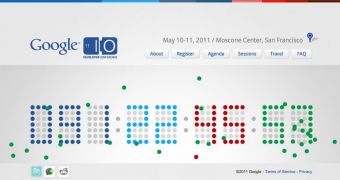Google's I/O conference is the one big occasion Google gets to strut its stuff in front of developers, showcasing its latest and greatest technology. Registrations for this year's edition opened yesterday, 91 days before the conference. The registrations closed yesterday as well, since the seats sold out in just 59 minutes, shattering all previous records.
"We’ve been counting down the days until Google I/O 2011 and hope that you have been, too. With 91 days, 22 hours and 45 minutes to go, we’re excited to announce that registration is now open," Vic Gundotra, VP Engineering announced.
But just one hour later he tweeted "Google I/O 2011 sold out in 59 minutes! Holy moly."
This year, developers have been eagerly awaiting for the registration period to open, apparently, and they haven't lost too much time buying the tickets. Android's success and Chrome's growth should be at least partially responsible for the surge in interest.
At an Early Bird rate of $450, the tickets weren't that expensive either. Tickets at this price were supposed to last until April 16, at which time the full price would kick in, but that's no longer the case.
Considering that Google has a habit of handing out expensive Android-powered phones at the conference, last year it was the HTC Evo 4G, the price is not really an issue.
"The focus of I/O 2011 will be all about the cloud, and feature the latest Google products and technologies including Android, Google Chrome, App Engine, Google Web Toolkit and Google APIs," Gundotra explained.
"There will be many opportunities to meet members of Google’s engineering teams and take deep dives into the technologies with more than 100 technical sessions, roundtables and more," he added.
There have been several big announcements at Google I/O over the years and 2011 will probably be no different. Last year, the big announcement was the Chrome Web Store, which has since went live.
Google unveiled the WebM open video format at Google I/O 2010, one of the most important moves in the development of HTML5 video. Android 2.2 Froyo was also launched at the conference.
In 2009 it was Google Wave which stirred huge interest at the time. Labeled as an email killer and a revolution in communications, it didn't live up to Google's expectations and has since been killed off, though it continues as an open source project.

 14 DAY TRIAL //
14 DAY TRIAL //